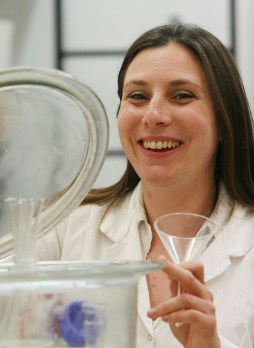| Safer anti-epileptic drug compounds win innovation award for Hebrew University pharmacy graduate student | |||
| |||
Safer versions of current anti-epileptic drugs that promise to eliminate harmful side effects have been formulated by a Ph.D. student at the Hebrew University of Jerusalem School of Pharmacy. For her discovery, Neta Pessah received one of the prestigious Kaye Innovation Awards presented on June 9 during the Hebrew University Board of Governors meeting in Jerusalem. Epilepsy is one of the most common neurological disorders, affecting about one percent of the world's population. Many new antiepileptic drugs have been introduced to the clinics recently, but despite the availability of these drugs, about 30 percent of the patients are still not seizure free. Furthermore, many of the available drugs cause side effects, which can sometimes be fatal. One of the leading drugs for treating epilepsy and other neurological disorders is valproic acid (VPA). However, this drug has two life threatening side effects, liver toxicity and fetal malformation, that are related to the drug's chemical structure. In Pessah’s ongoing research with VPA, she was successful in designing and synthesizing a new family of compounds based on a non-harmful analogue of that drug. Two of the compounds she formulated, Alpha-F-TMCD and Alpha-Cl-TMCD, were found to be highly potent as anticonvulsants without harmful side effects when tested on animal models. Alpha-Cl-TMCD is now under further testing at the National Institutes of Health in the United States. Pessah says that her results suggest that these two novel compounds have high potential for development into new drugs to treat different types of epilepsy, neuropathic pain and other central nervous system disorders. The compounds have shown high potency, wide safety margins and lack of harmful effects on fetuses. The Kaye Innovation Awards have been given annually since 1994. Isaac Kaye of England, a prominent industrialist in the pharmaceutical industry, established the awards to encourage faculty, staff and students of the Hebrew University to develop innovative methods and inventions with good commercial potential which will benefit the university and society. Source : | |||

Commentaires